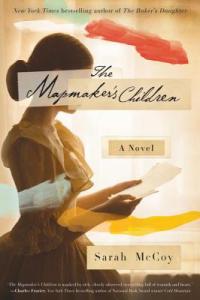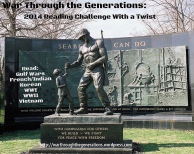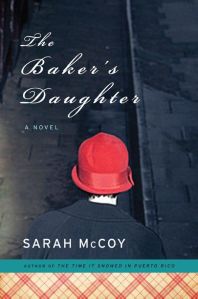
Source: Review copy from Crown
Rating:: ★★★★★
Today could not have meaning without the promise of ending. Birth and death, beginning and ending — they were one in the universe’s memory.
But who would remember her tomorrow?
(from The Mapmaker’s Children, page 67)
Quick summary: Sarah McCoy’s latest novel, The Mapmaker’s Children, is a dual narrative whose threads are connected by two women struggling with the fact that they are unable to have children. Eden Anderson in present-day New Charlestown, West Virginia, has moved away from the hubbub of Washington, D.C., in hopes of finally conceiving a child, but when that doesn’t pan out, she’s left with anger toward her husband, a dog she doesn’t want, and a mysterious porcelain doll head found in the root cellar. In Civil War-era New Charleston, Sarah Brown, daughter of the abolitionist John Brown, aims to use her artistic talents for the Underground Railroad and find a greater purpose for her life since a husband and family are not an option.
Why I wanted to read it: I’ve loved McCoy’s writing since The Baker’s Daughter.
What I liked: McCoy is a word artist, and I loved this book from start to finish. The pictures she paints with only a few words draw you into the characters’ worlds, and she’s one of only a few authors able to make the present-day storyline just as compelling as the historical one. Eden’s relationships with Cleo and Cricket and Sarah’s relationships with Freddy and the rest of the Hill family are touching and show how families can be created in the most unexpected ways. The mystery of the doll head and the history of the Underground Railroad enrich the story and beautifully connect the past and present narratives, and I appreciated the author’s note at the end where McCoy explains her inspiration for the novel and all the research involved.
What I disliked: Absolutely nothing! The Mapmaker’s Children is another winner from McCoy!
Final thoughts: The Mapmaker’s Children is a beautifully written novel driven by heroines who are real in their emotions and their flaws, and McCoy brilliantly pulls Sarah Brown out of the shadows of history and brings her to life in full color. Sarah and Eden are separated by more than a century, but their journeys toward love and family are universal. McCoy is a master storyteller, and The Mapmaker’s Children is destined for my “Best of 2015” list!
Thanks to TLC Book Tours for having me on the tour for The Mapmaker’s Children. To follow the tour, click here.
Disclosure: I received The Mapmaker’s Children from Crown for review.
© 2015 Anna Horner of Diary of an Eccentric. All Rights Reserved. Please do not reproduce or republish content without permission.



 Reba’s hand lifted off the page. This was more interesting than expected. She tried to keep a neutral tone. “Were you a Nazi?”
Reba’s hand lifted off the page. This was more interesting than expected. She tried to keep a neutral tone. “Were you a Nazi?”

